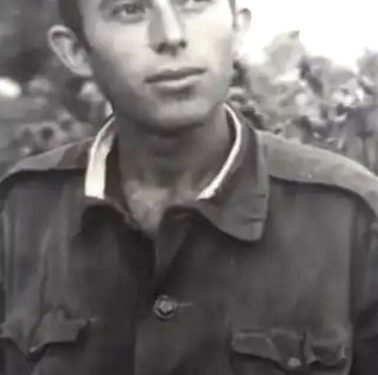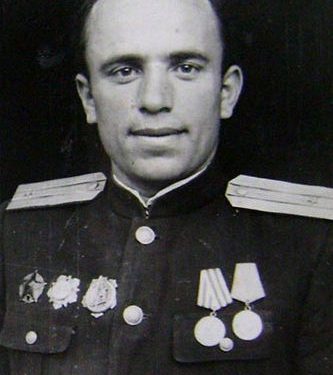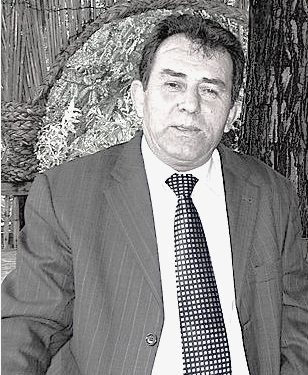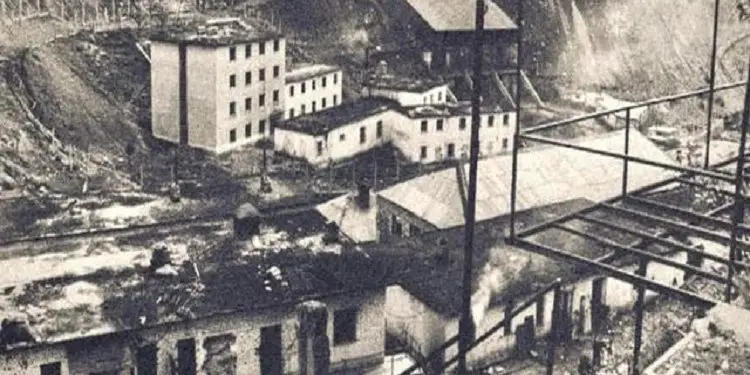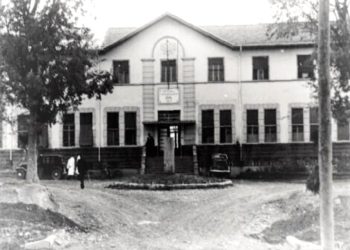By Shkëlqim ABAZI
Part thirty-three
S P A Ç
The Grave of the Living
Tirana, 2018
(My memories and those of others)
Memorie.al /Now in my old age, I feel obliged to tell my truth, just as I lived it. To speak of the modest men, who never boasted of their deeds and of others whose mouths the regime sealed, burying them in nameless pits? In no case do I presume to usurp the monopoly on truth or claim the laurels for an event where I was accidentally present, even though I desperately tried to help my friends, who tactfully and kindly deterred me: “Brother, open your eyes… don’t get involved… you only have two months and a little more left!” A worry that clung to me like an amulet, from the morning of May 21, 22, and 23, 1974, and even followed me in the months after, until I was released. Nevertheless, everything I saw and heard during those three days; I would not want to take to the grave.
Continued from the previous issue
“By G…od, the ideal one, they have tied the festival to the back of your heads, you lot!” the other one spat. “Even the pig lives cleaner, you prick!” he spat. “Ptu-hh, cadaver!” he spat. “May the beasts of the forest devour you!” he spat. The arsenal of curses was finished, and the spitting increased. Those who did not express their hatred with words displayed it with spittle and phlegm: “Ptu-hh. P-sh-ëh, psh-iu, pshë-u, pja-u.” “Stinking bastards!”
Çelo Arrëza, followed by chairman Mediu and the retinue of long-legged officers, appeared from the door of the technical office. Carefully avoiding the stench of the prison sweat, they took to the shade of the gate at the top of the stairs, next to Xhelal bey and Hilë Pashku (Keqi), who were serving as their honor guard.
The Great One looked relaxed and cheerful: “And these, what do I have them for?” he played the actor, as if standing before a theatrical prop. “You’ve made a laughing stock of the whole world, Frrok!” and he burst out laughing, $ga-ga-ga$. “These ones are disobedient!” explained the police commander. “Whereas the rest were unshorn like students, comrade!” and Frroku blushed scarlet. “Well done, the Party wants you like this, Frrok!” Çelo praised him and turned to the tied men: “Xhelal Bey, did your mouth fart out some nonsense, that they have you on honor guard?” he addressed the one tied on the right. “By the looks of it, your lordship didn’t have enough of the ones you had, so you added one from the South, one from the North!” Xhelali retorted. “Your mouth, Xhelal Bey, doesn’t stay quiet!” “Why, must we only use this poor thing for eating?” “What have these done, Frrok?” he turned to the commander from Rrëshen, who shrank like a crestfallen rooster. “One of them is mocking the Party, the other one…” “Who, Xhelali?!” Çelo Arrëza interrupted. “This mustachioed one! He looks like a sworn enemy, he…” “Untie him!” the Great One ordered. “He is going to die like that, Frrok!” Xhevdet the long-legged freed him and shook the German cuffs: “Here you have them again!” “Bravo, if you don’t know anything else to do!” Xhelali descended the stairs, stretching his numb arms. “And you, Hilë, didn’t you give this one a slap, eh?” he turned to Hilë Keqi. “He was armed!” the featherless rooster shook his beak in the air. “What kind of weapon is this, you idiot! With this, he has filled our offices with jokes, man!” and he turned to the tall one. “Untie him, Xhevdet, or Frroku will leave us without picture frames!” The rooster did not react, the Great One smiled benignly.
Whenever the Great One stepped into the camp, the usual noise subsided. He would traverse the area from one end to the other, occupying the dominant positions like a strategist on the battlefield, inspecting the dormitories, terraces, buildings, and so on. He would issue momentary orders and directives, and then leave. When hunger strikes occurred, he would come accompanied by the operative, summon the duty officer, the service police, the chairman of the Technical Office, and sometimes the doctor, the barrack supervisor, the foreman, the barber, the cooks, and, naturally, the striker as the protagonist of the event, and he would dispense justice. Naturally, Çelo’s justice was not based on law or regulations, but on whatever popped into his head. The megalomaniac brute resolved everything according to his whim and it had to be implemented strictly, point by point, as he commanded. As usual, you wouldn’t find justice with him, but when Çelo was in a good mood, you might even win. Thus, the bonehead who thought he knew everything presented himself as the father of all, but an archaic father, who made the sun, the rain, the day, the night, and when “father” was in a frenzy, woe betide anyone who crossed him; exemplary punishment awaited them. In communist circles, he was known as the archangel of souls.
During the war, he had been part of the punitive units and, as such, had demonstrated loyalty by eliminating dozens of “enemies” of the Party and Enver’s personnel from behind. The professional assassin did not spare even relatives when the Party demanded it; he would put a bullet in the back of their head, and was even foolish enough to boast about his deeds, without a shred of conscience. His superiors converted these “merits” into the post of perpetual commander in political prisons, much like how in Italy, individuals distinguished for their contributions to the nation are appointed Senator for Life. Çelo’s chest was so heavy with orders and decorations that he walked with his head tilted back from their weight. He was one of the few who had received every possible medal, so among his peers, he acted superior, while with the convicts, he played both the devil and the angel, but more often the devil.
When he raged, the cells would be packed, there wouldn’t be a pillar without a crucified person underneath, the cudgel would swing day and night, there were no medical reports, no family visits, no correspondence, no books; everyone cursed the monster and the fate that crossed their path, even the military personnel themselves cursed him. When Çelo mellowed somewhat, one could hope for some “good,” but he was moody. In a moment of indulgence, entertainment in the camp increased; the central square was turned into a volleyball court, they set up some ping-pong tables, brought chess sets, added some musical instruments, and correspondence and visits with relatives somewhat normalized.
These inconsistent virtues-vices caused trouble among the police, creating a hidden competition, as each one tried to imitate him to catch his eye and win his favor. The battle for supremacy transformed the officers into astonishing puppets, because everyone attempted to resemble the brute, whether in the way they walked, behaved, in their expressions, but especially in their Çelo-style thinking, and they perfected their gestures to appear more “trendy” in His eyes and ours. They would smile at us like kindly fathers during the Great One’s moments of joy, but when the One’s wrath peaked, the savagery turned into masochism, so rarely did they show pity; naturally, they matched their gestures to the spiritual state of their idol. Often, the rivalries and grudges crossed the circle of career military officers and reached us; sometimes we even benefited from this competition, but more often we lost. We lost because they did not consider us human, but simply reptiles or bargaining chips and instruments of hegemony, in the service of careerist stubbornness. Ambition sometimes degenerated into regional antipathy, and because the leaders of the Central Directorate of Prisons and almost the entire chain of senior officers were dominated by Tosks (Southerners), the Southerners prevailed, and woe to the Northerners who opposed them. So true was this that as values were inverted, Northern officers concocted schemes to charm the icon, imitating him and behaving like Southerners, thus remaining under orders, with only the police being used as bludgeons.
Scenes like the one unfolded before our eyes had been repeated before, but merciful instances were sporadic, because violence remained constant and terror never subsided; the curve lowered and rose depending on the waves of class warfare. When the struggle gained momentum in society, violence intensified in the prisons; and conversely, détente between two attacks slightly lowered the tempo, to prepare for the next, even more damaging confrontation. The game resembled a truce between two warring armies, who exploit moments of relative calm to refresh or clash more savagely. The mood of the prison police changed by the hour. Compliments or criticisms from above served as a barometer; when the “plan” was realized, when no extraordinary events occurred such as: murders outside the wire, escapes from the camp, politically motivated revolts, and other incidents of this nature, praises flowed like a river, orders and decorations shone on their chests, while a few extra coins jingled in their wallets, consequently their faces beamed and the violence lessened somewhat.
Conversely, when unforeseen events happened, repression peaked, the stake swung, dozens of wretches would groan tied to pillars, dozens of others would end up in the camp cells, and several dozen more would even be re-arrested and sent for re-sentencing to the cells of the Internal Affairs Branch in Rrëshen; the officers’ faces darkened, their mouths locked shut, opening only to gnash their teeth, to spew bile and screams, curses and insults that would shame even the dregs of society. But in May 1971, the liberal spirit and statist grandiosity peaked; the executioners morphed into angels. Two years later, those cheerful faces would turn grim and dark, and they would cover the fence thorns with chips of clotted brain, sowing violence, terror, death…!
The “Fatherly” Advice!
“Convicts!” Çelo’s tenor boomed. “In today’s inspection, we found that there are still individuals among you who do not want to be rehabilitated. Understand? We found prohibited items that you could use for subversive purposes, books in foreign languages, notebooks with suspicious notes, imperialist musical instruments, some nonsensical female characters and other scribbles. Understand? What kind of people have you been, for goodness sake! Still with Russian, French, English, Italian, and others? Don’t waste your time with capitalist-revisionist languages, man! You want foreign languages; learn them, who stopped you? Understand? You have Chinese, man, the language of the great Marxist-Leninist Chairman Mao, Korean of Kim Il-sung, Vietnamese of Ho Chi Minh…” “But what if they turn out to be traitors like Tito and Khrushchev, then good luck with that language!” “Marroku” intervened. “Shut up, you cucumber!” Xhevdet Balla threatened and shook his finger. “You have Cuban of Fidel Cas…” but someone whispered in his ear: “Forget it, forget it entirely, it looks like that bearded man is also moving towards the revisionists.” “We also have the languages of Marx, Engels, Lenin, and Stalin!” Qani Çollaku chimed in. “Exactly, learn those, man!” But again, something was whispered to him, and Çelo jumped up. “No, no, forget them entirely, because Hitler, Churchill, and Roosevelt spoke those languages, and now Nixon and Johnson and that doll, the Queen of England, are flapping their gums too much, but Brezhnev and Kosygin and the whole flock of revisionists speak them too. Understand?”
He paused briefly, took a deep breath, adjusted the collar over his fat neck, cleared his throat, and resumed: “What do you need the guitar, the violin, the mandolin, jazz, the sax, and the trombone for? Those are decadent instruments and have ruined morality…! Understand?” “The anthem of the International, the ‘Marseillaise,’ and revolutionary marches were sung with those instruments, Mozart, Beethoven, Verdi, Tchaikovsky, etc. composed with them!” Ali “Tromba” couldn’t hold back. “Well, alright, play them, who said not to play them, compose, who said no, but lean on the foundation, man, on our traditional instruments, on the drum, the tambourine, the fiddle, the two-stringed lute! Understand?”
He paused once more, looked benignly like Zeus from the top of Olympus, and continued his speech: “Did you get it, man, understand? The Party wants you to be rehabilitated, we support you in becoming useful for your families and the socialist society, but whoever does not want to improve, we owe them nothing, we will do it with the stick… Understand?” “You will find it with a stick, Commander? O-bo-bo mother, my back!” “Marroku” jumped as if bitten by a snake. “Will you shut up, you cucumber or… if your back is itching, we’ll scratch it for you!” Xhevdet threatened him. “By chance, among you there are some Catholic priests and some hodjas, some scribblers and some cabaret show-offs, some scratchers and pen-pushers who want to corrupt others too. Understand? We won’t let them, man, pollute our atmosphere! If their heads have gone bad, we will chop them off completely, man! What’s more, they do propaganda! Understand? Hey, what do we have the commissar, Comrade Shahin, for? That’s his job, to clear your brains with the light of the teachings of Marxism-Leninism and Comrade Enver. To foam at the mouth until he makes you useful for Socialist Albania and for… Understand?” “We understand!” “Did you get it now?”
“We thank the Party, which cares to turn us into… spies!”
“Amen!”
“Shut up, you buffoon, because for the ideal of the Party, I will…”
“And then what?”
“Then… you know yourself!”
“How could I not know?”
“Since we are chatting, let’s talk about a few things of mutual benefit.” When Çelo spoke this way, we waited, wondering if he would communicate an order or a decision, as often happened in such cases. In the anguish of waiting, the murmurs began: “Speak up, Commander, and get to the point of the conversation!” “It seems we made it, Xhelal Bey, the Party is thinking about us too!” Esat Kala remarked. “I know, the poor thing can’t sleep thinking about our troubles!” Xhelal Bey retorted. “Especially for this one, who is Abaz’s nephew!” he jabbed at Tomori. “In all likelihood this time, they will start with the fading Beys; for the rest of us, time will tell!” Tomori replied. “A gut feeling tells me there will be a special instruction for those who were convicted under age! The Party has a wide belly, my friend!” Zakja chuckled and winked at me.
“Silence, convicts!”
“The Party has a big heart, it thinks about you and your families…! Understand?” Çelo thundered.
“Oh, really, how did we not realize it sooner, for heaven’s sake?” Old Kami from Lazarat was stunned.
“Shut up, you leech!” Again, Xhevdet interfered.
“In the spirit of the guidelines of the Party and Comrade Enver, we plan to make a new organization!”
“Well done, man, what have you done to deserve it?” Qemal Merua winked at me, pointing at Esat.
“Oh-oh, we know where we will end up, chubby!” the target responded with a laugh.
“Whoever shows signs of rehabilitation will be rewarded, otherwise, they will be punished,” and Çelo continued: “But today, we have no intention of punishing anyone, or tying them to the pillar, or putting them in the cell. Even those who broke the rules, you saw that I gave the order to release them immediately.”
“No doubt, the Party is extremely lenient!” observed Doctor Astrit.
“So much so that it doesn’t get enough of us! I mean, with the love for us!” Shyqi interrupted.
“Hey, are you going to shut up or…!” Again, Xhevdet the long-legged intervened.
“The Party aims to help you get on the right track; violence remains the last resort…”
“Hooray-a-a, long live… violence!” “Marroku” jumped up enthusiastically.
“Is that true, huh?!”
“Yes, man!”
“Will you shut up or…!”
The difficulty in finding the right words caused the poor commander seven layers of sweat; his shirt was soaked, turning from green to black. The goat herd remained an amateur in everything, except for the ability to take whomever he wanted without batting an eyelid.
“The records clerk and the head of the Technical Office will communicate the decisions we made together. Understand? Now, have a good time!” he bid farewell, turned his back, and headed down the stairs.
“Have fun, Commander!” “Marroku” waved his hand.
“Shut up or for the idea…” Xhevdet threatened and disappeared beneath the tin sheet of the door, followed by the platoon of the Department of Internal Affairs, Rrëshen.
Organization or Punishment?
The place of the “great ones” on the podium was taken by the records clerk and a handful of low-ranking police officers. But the confrontation with seven hundred souls caused such an allergy to the newly graduated Security officer that his inferiority before the crowds was clearly noticeable, making him stammer so much he was barely understandable.
“We can’t hear, Sir!” a voice rose.
“Louder!” another one shouted.
“The town crier, let the town crier come!” a military man ordered.
The problem was now solved; Malo’s voice scraped the river bed.
“Listen, convicts, we are only reading the names of those who will be moved; the others remain where they were.” Commotion…!
“Silence, you lot!”
Silence and straining of ears. Kuqali read, Malo thundered:
“Ministry of Internal Affairs. Sector 303 Spaç.
Spaç, on 21.05.1971
Order No..x…, dated 21.05.1971.
For the attention of: Cadre and Organization Sector. Here.
Department of Internal Affairs, Rrëshen, Mirditë.
General Directorate of Prisons and Re-education Camps, near the Ministry of Internal Affairs.
General Directorate of People’s Police, Tiranë.
In support of the Decision of the Council of Ministers No…x, dated…., …,1970, Article 5, point 3, Article 7, points 1 and 4, as well as in implementation of Law No. xyz…; ‘On the Functioning of Sectors for Serving Sentences and Re-education of Persons Punished with Deprivation of Liberty by the People’s Courts,’ in Article…x, point 3, letter d, paragraph II, also upon proposal of the Re-education Council, the Leaders of the Technical Office, the Engineer-Technical Council, which operates near the Geological Exploitation-Mining Enterprise, Spaç Sector, based on the proposals of the Operative Worker of Sector 303, and with the approval of the Camp Command, with the aim of improving work and increasing mining output,
I ORDER:
“1- The convicts listed below will transition to the internal regime, pending further action.”
“Silence!”
“Stop talking, let us listen!”
But everyone was talking amongst themselves.
“Silence, you lot!” Malo’s shriek tore at our ears.
The reading began: Zef Ashta, Bardhyl Belishova, Koço Odria, Kapo Risilia, Ismail Vrioni, Haxhi Mekolli, Zeqir Vata, Qani Mulita, Piro.., Qemal Mero, Rakip Hadëri, Kapllan Resuli, Namik Hoxha, Miti…, Estref…, Ylvi…, Vat…, Spiro…, Feti Grëmi, Pavllo Popa, Tahir…, Ernest Troshani, Adem…, Engjëll Pulaha, Ceno Hekali, Nik Prela, the list closed. They would transition to unemployment, six hundreds of them.
In fact, they were the old, the crippled, and those beyond repair. They would soon be sent to Ballsh, to Burrel, and some would be met by Saint Peter. Commotion again. /Memorie.al




